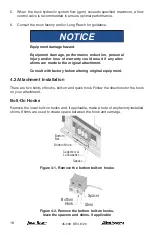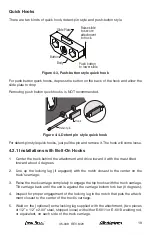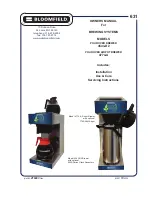
45-009 REV. 8/20
16
Function
Direction of motion
Load
Operator's hand on contro handle, facing the load*
Hoist
Up
Down
Rearward or up
Forward or down
Reach
Retract
Extend
Rearward or up**
Forward or down
Tilt
Rearward
Forward
Rearward or up**
Forward or down
Sideshift
Right
Left
Rearward or up
Forward or down
Push-pull
Rearward
Forward
Rearward or up**
Forward or down
Rotate, lateral
Clockwise
Counterclockwise
Rearward or up
Forward or down
Rotate, longitude
Rearward
Forward
Rearward or up
Forward or down
Load stabilizer
Down
Up
Rearward or up
Forward or down
Swing
Right
Left
Rearward or up
Forward or down
Slope
Clockwise
Counterclockwise
Rearward or up
Forward or down
Fork position
Together
Apart
Rearward or up
Forward or down
Trip
Engage
Release
Rearward or up
Forward or down
Grip
Engage
Release
Rearward or up
Forward or down
Truck stabilizer
Raise
Lower
Rearward or up
Forward or down
Clamp
Clamp
Release
Rearward or up
Forward or down
* For high lift order picker trucks and center control pallet trucks, predominant motion of the oper-
ator's hand when actuating the control handle while facing away from the load.
** The sense of rotation of the control handle is intended to be in the same direction as the desired
motion of the mast or load.
Figure 3-7, ANSI/ITSDF
Sequence of location and direction of motion for lever or hand-type controls
















































